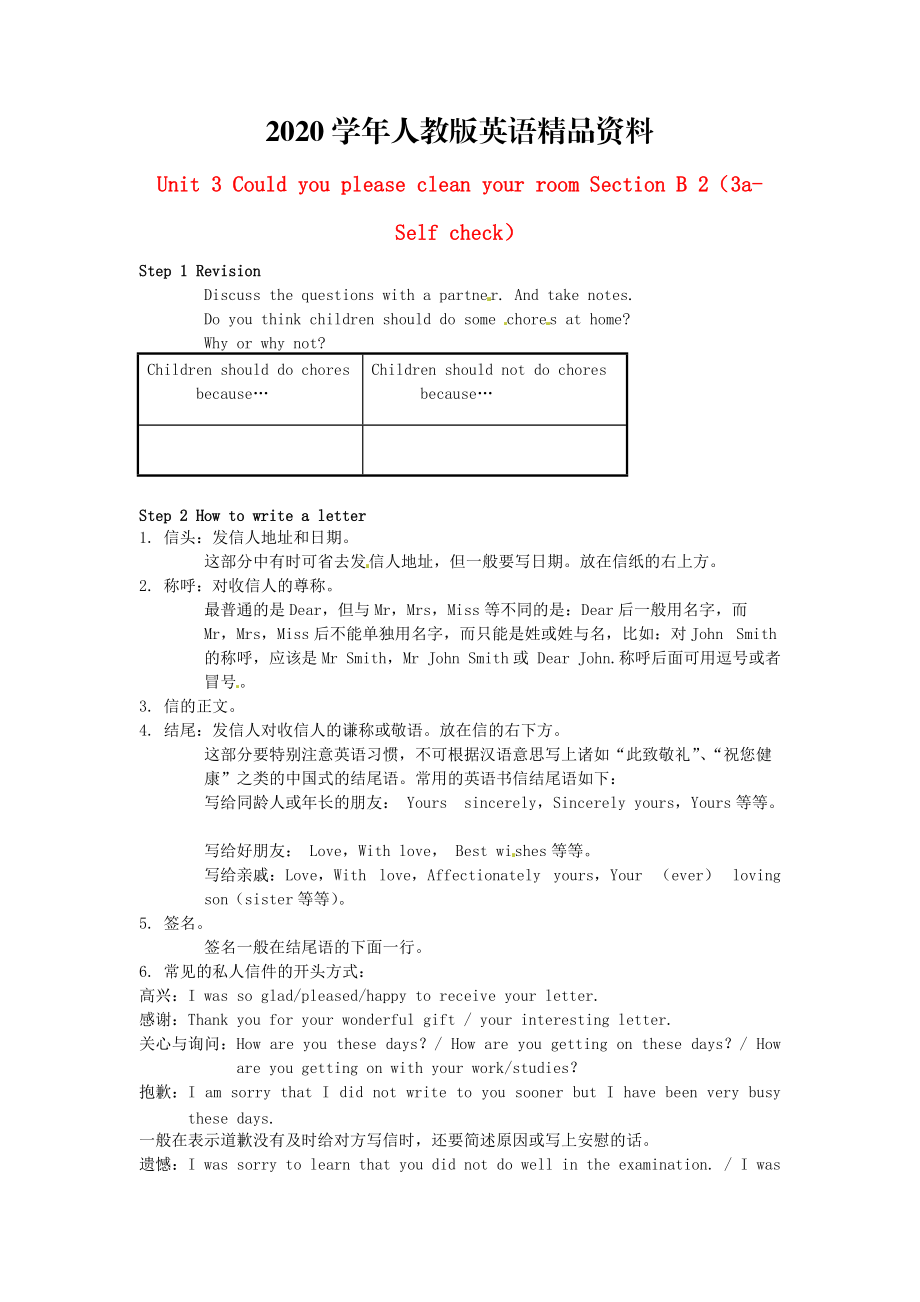《2020【人教版新目標(biāo)】八年級(jí)英語(yǔ)下冊(cè)Unit 3 Could you please clean your room Section B 23aSelf check》由會(huì)員分享,可在線閱讀����,更多相關(guān)《2020【人教版新目標(biāo)】八年級(jí)英語(yǔ)下冊(cè)Unit 3 Could you please clean your room Section B 23aSelf check(3頁(yè)珍藏版)》請(qǐng)?jiān)谘b配圖網(wǎng)上搜索。
1�、2020學(xué)年人教版英語(yǔ)精品資料
Unit 3 Could you please clean your room Section B 2(3a-Self check)
Step 1 Revision
Discuss the questions with a partner. And take notes.
Do you think children should do some chores at home?
Why or why not?
Children should do chores
because…
Children should not do chor
2、es
because…
Step 2 How to write a letter
1. 信頭:發(fā)信人地址和日期����。
這部分中有時(shí)可省去發(fā)信人地址,但一般要寫日期����。放在信紙的右上方�。
2. 稱呼:對(duì)收信人的尊稱��。
最普通的是Dear����,但與Mr,Mrs��,Miss等不同的是:Dear后一般用名字�,而Mr,Mrs�,Miss后不能單獨(dú)用名字,而只能是姓或姓與名�,比如:對(duì)John Smith的稱呼,應(yīng)該是Mr Smith��,Mr John Smith或 Dear John.稱呼后面可用逗號(hào)或者冒號(hào)����。
3. 信的正文。
4. 結(jié)尾:發(fā)信人對(duì)收信人的謙稱或敬語(yǔ)��。放在信的右下方�。
這
3、部分要特別注意英語(yǔ)習(xí)慣�,不可根據(jù)漢語(yǔ)意思寫上諸如“此致敬禮”、“祝您健康”之類的中國(guó)式的結(jié)尾語(yǔ)�����。常用的英語(yǔ)書信結(jié)尾語(yǔ)如下:
寫給同齡人或年長(zhǎng)的朋友: Yours sincerely��,Sincerely yours�����,Yours等等�����。
寫給好朋友: Love��,With love����, Best wishes等等。
寫給親戚:Love��,With love���,Affectionately yours��,Your (ever) loving son(sister等等)����。
5. 簽名。
簽名一般在結(jié)尾語(yǔ)的下面一行���。
6. 常見的私人信件的開頭方式:
高興:I was so glad/pleased/
4����、happy to receive your letter.
感謝:Thank you for your wonderful gift / your interesting letter.
關(guān)心與詢問:How are you these days�����?/ How are you getting on these days��?/ How are you getting on with your work/studies��?
抱歉:I am sorry that I did not write to you sooner but I have been very busy these days.
5���、一般在表示道歉沒有及時(shí)給對(duì)方寫信時(shí)�,還要簡(jiǎn)述原因或?qū)懮习参康脑挕?
遺憾:I was sorry to learn that you did not do well in the examination. / I was so upset to hear that you are ill these days. I do hope you are getting better.
Step 3 Writing
1. Write a letter to the Sunday Mail and express your opinion.
Dear Sir or Madam,
I think
6�、 /believe that __________. I agree/disagree that ________________.
I think it is fair/unfair for children to __________________________________.
I think children should/should not ____ because ________________________.
For example, they should/should not_________ because ___________________.
You
7��、rs truly,
__________
2. Useful phrases.
help with housework and chores at home
have enough stress from school
spend the time on school work in order to…
There is no need for them to…
It is important for sb. to do sth.
It’s not enough to…
develop children’s independence
The more…, the more…
8、
Step 4 Self check
1. Make a list of chores using these verbs.
1. do _______________________
2. clean _____________________
3. make _____________________
4. fold _______________________
5. sweep ____________________
6. take out ___________________
Answers: do the dishes clean the living r
9�、oom make your bed
fold your clothes sweep the floor take out the rubbish
2. Are these polite requests or permissions? Write the numbers in the correct
places in the chart.
1. Could you please do your homework?
2. Could I watch TV?
3. Could you take out the rubbish first?
4. Could I use your computer?
5. Could I leave now?
6. Could you come back before nine?
Requests
Permissions
2 4 5
1 3 6
Step 5 Homework
Use the questions in activity 2 to write a conversation.
A: _______________________
B: _______________________
 2020【人教版新目標(biāo)】八年級(jí)英語(yǔ)下冊(cè)Unit 3 Could you please clean your room Section B 23aSelf check
2020【人教版新目標(biāo)】八年級(jí)英語(yǔ)下冊(cè)Unit 3 Could you please clean your room Section B 23aSelf check

